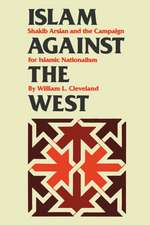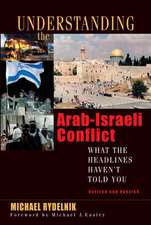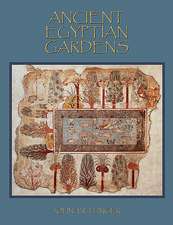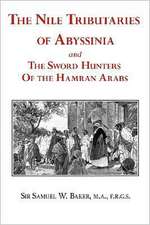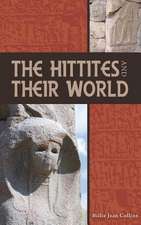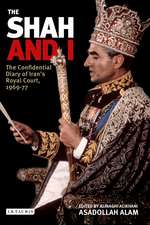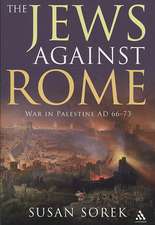A History of the Modern Middle East
Autor William L. Cleveland, Martin Buntonen Limba Engleză Paperback – 2 aug 2016
The sixth edition has been revised to provide a thorough account of the major developments since 2012, including the tumultuous aftermath of the Arab uprisings, the sectarian conflict in Iraq and civil war in Syria that led to the rise of ISIS, the crises in Libya and Yemen, and the United States' nuclear talks with Iran. With brand-new timelines in each part, updated select bibliographies, and expanded online instructor resources, A History of the Modern Middle East remains the quintessential text for courses on Middle East history.
| Toate formatele și edițiile | Preț | Express |
|---|---|---|
| Paperback (2) | 286.13 lei 22-36 zile | +40.28 lei 5-11 zile |
| Taylor & Francis – 29 iul 2024 | 286.13 lei 22-36 zile | +40.28 lei 5-11 zile |
| Taylor & Francis – 2 aug 2016 | 479.07 lei 22-36 zile | |
| Hardback (2) | 1023.79 lei 43-57 zile | |
| Taylor & Francis – 13 iun 2019 | 1339.62 lei 22-36 zile | |
| Taylor & Francis – 29 iul 2024 | 1023.79 lei 43-57 zile |
Preț: 479.07 lei
Preț vechi: 563.62 lei
-15% Nou
Puncte Express: 719
Preț estimativ în valută:
91.70€ • 99.64$ • 77.08£
91.70€ • 99.64$ • 77.08£
Carte disponibilă
Livrare economică 31 martie-14 aprilie
Preluare comenzi: 021 569.72.76
Specificații
ISBN-13: 9780813349800
ISBN-10: 081334980X
Pagini: 624
Dimensiuni: 152 x 229 x 39 mm
Greutate: 0.95 kg
Ediția:Sixth Edition, Sixth Edition
Editura: Taylor & Francis
Colecția Routledge
Locul publicării:Oxford, United Kingdom
ISBN-10: 081334980X
Pagini: 624
Dimensiuni: 152 x 229 x 39 mm
Greutate: 0.95 kg
Ediția:Sixth Edition, Sixth Edition
Editura: Taylor & Francis
Colecția Routledge
Locul publicării:Oxford, United Kingdom
Public țintă
Undergraduate CoreCuprins
List of Illustrations Preface to the Sixth Edition Acknowledgments A Note About Place Names and Transliteration PART ONE: The Development of Islamic Civilization to the Eighteenth Century 1. The Rise and Expansion of Islam Pre-Islamic Arabia Muhammad and the Foundations of Islam The Arab Conquests and the First Empire The First Civil War and the End of the Rashidun Caliphate From Arab Exclusivism to Islamic Universalism: The Umayyad and Abbasid Empires Conclusion 2. The Development of Islamic Civilization to the Fifteenth Century Patterns of Islamic History The Creation and Uses of Wealth Islamic Rituals and Institutions Two Versions of Leadership: Sunni Caliph and Shi'a Imam The Middle East from the Eleventh to the Fifteenth Centuries: An Overview Conclusion 3. The Ottoman and Safavid Empires: A New Imperial Synthesis The Rise of the Ottoman Empire Ottoman Ruling Institutions and Attitudes The Loss of Ottoman Superiority The Triumph of Shi'ism: The Safavid Empire of Iran, 1501--1736 Conclusion: The Sunni-Shi'a Struggle for Iraq PART TWO: The Beginnings of the Era of Transformation 4. Forging a New Synthesis: The Pattern of Reforms, 1789--1849 Selim III (1789--1806: Between Old and New A Revived Center of Power: The Egypt of Muhammad Ali, 1805--1848 Nationalism and Great Power Intervention: The Greek Revolt, 1821--1829 Sultan Mahmud II (1808--1839): Centralization and Transformation Conclusion 5. The Ottoman Empire and Egypt During the Era of the Tanzimat The Tanzimat: Continued Ottoman Reform Under the Bureaucrats The Arab Provinces of Greater Syria During the Tanzimat Egypt During the Era of Civilian Reform Conclusion: The Dualism of the Nineteenth-Century Reforms 6. Egypt and Iran in the Late Nineteenth Century England on the Nile: The British Occupation of Egypt, 1882--1914 Iran During the Second Half of the Nineteenth Century Conclusion 7. The Response of Islamic Society Religious Assertiveness and Authoritarian Reform: The Era of Abdul Hamid II Islamic Puritan
Descriere
A History of the Modern Middle East examines the profound and often dramatic transformations of the region in the past two centuries, from the Ottoman and Egyptian reforms, through the challenge of Western imperialism, to the impact of US foreign policies.
Recenzii
"The late William L. Cleveland’s A History of the Modern Middle East became an instant classic upon initial publication in 1994. Unlike classics which remain frozen in time, however, Martin Bunton has provided incisive updates since 2008, culminating in this seventh edition of 2024. For the beginner or the advanced scholar, there is no better introduction to the political and cultural history of the last two and a half centuries of the modern Middle East."
Donald Malcolm Reid, Professor Emeritus, Department of History, Georgia State University / Affiliate Professor, Department of Middle Eastern Languages and Cultures, University of Washington
"A History of the Modern Middle East is by far the best textbook on the Middle East. The writing is clear and the arguments are concise and balanced. I have used many texts over the years; none come close to Cleveland and Bunton."
Joshua M. Landis, Sandra Mackey Chair in Middle East Studies, Director of the Center for Middle East Studies and Farzaneh Family Center for Iranian and Persian Gulf Studies, University of Oklahoma
"One of the most accessible histories of the Middle East, which in this seventh edition covers the long span from the rise of Islam to the aftermath of the Arab Uprisings of 2011 and the subsequent shifts in power dynamics in the region. Its clearly-written account makes it the perfect textbook for survey courses on the Middle East."
Negin Nabavi, associate professor in History, Montclair State University
Praise for Prior Editions
"An excellent overview of the history of the modern Middle East. Eminently clear, comprehensive, and insightful. A truly superior book."
James Jankowski
"Cleveland and Bunton provide a comprehensive history of the Middle East that allows students to understand the decisions of the principal political actors and the results of major events and crises. It has been an indispensable textbook for my survey on how and why the peoples of the Middle East deal with issues of democracy, religious and national identity as well as conflicting reactions toward Western intervention in a variety of forms."
Stacy E. Holden
"Cleveland has written a cogent and comprehensive political history of the Middle East in the nineteenth and twentieth centuries, prefaced by a concise and readable introduction to Islamic history. He is particularly successful in pointing to the persistence and strength of traditional modes of thought and belief in bringing about the reassertion of Islamic identity in the face of the moral bankruptcy of contemporary Middle Eastern regimes and the disempowering pressures of everyday life . . . this book should do much to demystify common misconceptions about this complex and frequently misunderstood region."
Peter Sluglett
"Cleveland's timely book is now the most comprehensive, up-to-date introduction to the history of the modern Middle East, and it is likely to remain so for a good long while. He does a marvelous job of rendering intelligible the complex political and social changes that the Middle East experienced in the past two centuries. Readers will be grateful to Cleveland for blending much of the best recent historical scholarship into this fine book and for making it eminently readable."
Philip S. Khoury
"For almost thirty years, I have depended on Cleveland and Bunton's textbook as the anchor of my course on the history of the modern Middle East. It is, to my mind, the very best and most teachable text available."
Lidwien Kapteijns
"One of the most balanced and comprehensive textbooks that exists on Middle Eastern history."
Sreemati Mitter
"The book masterfully intertwines complex strands of history – from sectarian conflict in Lebanon, to the Arab-Israeli conflicts, to the impact of oil wealth and the Iranian revolution. No other volume does this so well."
Elizabeth Thompson
"The difficulties of writing an introductory text on the modern Middle East have largely been overcome by William L. Cleveland in this lucid and impartial history. Perhaps the greatest virtue of the book is the author's sympathetic detachment in his treatment of an ideologically charged history. Always measured in his assessments, Cleveland avoids lionizing and vilifying whether discussing the colonial experience, the rise of nationalism, the struggle for Palestine, the influence of Nasser or the Islamic resurgence.”
Eugene Rogan in British Journal of Middle Eastern Studies
"This book provides a comprehensive and compelling history of the modern Middle East and is an invaluable addition to any scholar's library. The authors distill complex and multifaceted aspects of Middle Eastern history and culture for the reader while providing insightful and germane analysis."
Ellen R. Wald
"This is the best comprehensive survey of modern Middle East history in the literature. The authors excel at translating complex and controversial subject matter in a highly readable manner without sacrificing cogent and insightful analysis. I highly recommend it."
David W. Lesch
"This survey of the history of the modern Middle East has been well received by scholars in the field. Sophisticated and stimulating . . . Cleveland has contributed a well-balanced, well-researched, and well-planned introductory text for the study of the modern Middle East."
Judith Mendelsohn Rood in Turkish Studies Association Bulletin
"This volume is history in the best sense . . . A superbly written analysis of the social and political disruptions of the Middle East. This updated volume does an excellent job of weaving together various strands of a complex subject in a coherent narrative. It is recommended reading for all serious students who want to understand how the Middle East got to where it is today."
Phebe Marr
"With the accuracy and balance that the scholar would insist on and with the spirited readability that the student would hope for, this is a fine interpretive study of the Middle East during the past two centuries. A richly textured history, it handles the challenge of highlighting the cultural unity characterizing the Middle East while also demonstrating the region's diversity – political, religious, cultural, and economic."
L. Carl Brown
Donald Malcolm Reid, Professor Emeritus, Department of History, Georgia State University / Affiliate Professor, Department of Middle Eastern Languages and Cultures, University of Washington
"A History of the Modern Middle East is by far the best textbook on the Middle East. The writing is clear and the arguments are concise and balanced. I have used many texts over the years; none come close to Cleveland and Bunton."
Joshua M. Landis, Sandra Mackey Chair in Middle East Studies, Director of the Center for Middle East Studies and Farzaneh Family Center for Iranian and Persian Gulf Studies, University of Oklahoma
"One of the most accessible histories of the Middle East, which in this seventh edition covers the long span from the rise of Islam to the aftermath of the Arab Uprisings of 2011 and the subsequent shifts in power dynamics in the region. Its clearly-written account makes it the perfect textbook for survey courses on the Middle East."
Negin Nabavi, associate professor in History, Montclair State University
Praise for Prior Editions
"An excellent overview of the history of the modern Middle East. Eminently clear, comprehensive, and insightful. A truly superior book."
James Jankowski
"Cleveland and Bunton provide a comprehensive history of the Middle East that allows students to understand the decisions of the principal political actors and the results of major events and crises. It has been an indispensable textbook for my survey on how and why the peoples of the Middle East deal with issues of democracy, religious and national identity as well as conflicting reactions toward Western intervention in a variety of forms."
Stacy E. Holden
"Cleveland has written a cogent and comprehensive political history of the Middle East in the nineteenth and twentieth centuries, prefaced by a concise and readable introduction to Islamic history. He is particularly successful in pointing to the persistence and strength of traditional modes of thought and belief in bringing about the reassertion of Islamic identity in the face of the moral bankruptcy of contemporary Middle Eastern regimes and the disempowering pressures of everyday life . . . this book should do much to demystify common misconceptions about this complex and frequently misunderstood region."
Peter Sluglett
"Cleveland's timely book is now the most comprehensive, up-to-date introduction to the history of the modern Middle East, and it is likely to remain so for a good long while. He does a marvelous job of rendering intelligible the complex political and social changes that the Middle East experienced in the past two centuries. Readers will be grateful to Cleveland for blending much of the best recent historical scholarship into this fine book and for making it eminently readable."
Philip S. Khoury
"For almost thirty years, I have depended on Cleveland and Bunton's textbook as the anchor of my course on the history of the modern Middle East. It is, to my mind, the very best and most teachable text available."
Lidwien Kapteijns
"One of the most balanced and comprehensive textbooks that exists on Middle Eastern history."
Sreemati Mitter
"The book masterfully intertwines complex strands of history – from sectarian conflict in Lebanon, to the Arab-Israeli conflicts, to the impact of oil wealth and the Iranian revolution. No other volume does this so well."
Elizabeth Thompson
"The difficulties of writing an introductory text on the modern Middle East have largely been overcome by William L. Cleveland in this lucid and impartial history. Perhaps the greatest virtue of the book is the author's sympathetic detachment in his treatment of an ideologically charged history. Always measured in his assessments, Cleveland avoids lionizing and vilifying whether discussing the colonial experience, the rise of nationalism, the struggle for Palestine, the influence of Nasser or the Islamic resurgence.”
Eugene Rogan in British Journal of Middle Eastern Studies
"This book provides a comprehensive and compelling history of the modern Middle East and is an invaluable addition to any scholar's library. The authors distill complex and multifaceted aspects of Middle Eastern history and culture for the reader while providing insightful and germane analysis."
Ellen R. Wald
"This is the best comprehensive survey of modern Middle East history in the literature. The authors excel at translating complex and controversial subject matter in a highly readable manner without sacrificing cogent and insightful analysis. I highly recommend it."
David W. Lesch
"This survey of the history of the modern Middle East has been well received by scholars in the field. Sophisticated and stimulating . . . Cleveland has contributed a well-balanced, well-researched, and well-planned introductory text for the study of the modern Middle East."
Judith Mendelsohn Rood in Turkish Studies Association Bulletin
"This volume is history in the best sense . . . A superbly written analysis of the social and political disruptions of the Middle East. This updated volume does an excellent job of weaving together various strands of a complex subject in a coherent narrative. It is recommended reading for all serious students who want to understand how the Middle East got to where it is today."
Phebe Marr
"With the accuracy and balance that the scholar would insist on and with the spirited readability that the student would hope for, this is a fine interpretive study of the Middle East during the past two centuries. A richly textured history, it handles the challenge of highlighting the cultural unity characterizing the Middle East while also demonstrating the region's diversity – political, religious, cultural, and economic."
L. Carl Brown
Notă biografică
William L. Cleveland died in 2006, shortly following his retirement as an award-winning professor of history at Simon Fraser University, Canada. He received his BA from Dartmouth College and his PhD from Princeton University. A specialist in the study of Arab nationalism, he is the author of three books, along with numerous chapters and articles. In recognition of his exceptional contributions to education and training in Middle East Studies, he was the 2006 recipient of the Middle East Studies Association’s Mentorship Award.
Martin Bunton is a professor of history at the University of Victoria, Canada. His first book focused on colonial land policies in Palestine during the inter-war period, and he has also written The Palestinian-Israeli Conflict: A Very Short Introduction. He studies and teaches the Middle East in a global context.
Martin Bunton is a professor of history at the University of Victoria, Canada. His first book focused on colonial land policies in Palestine during the inter-war period, and he has also written The Palestinian-Israeli Conflict: A Very Short Introduction. He studies and teaches the Middle East in a global context.




